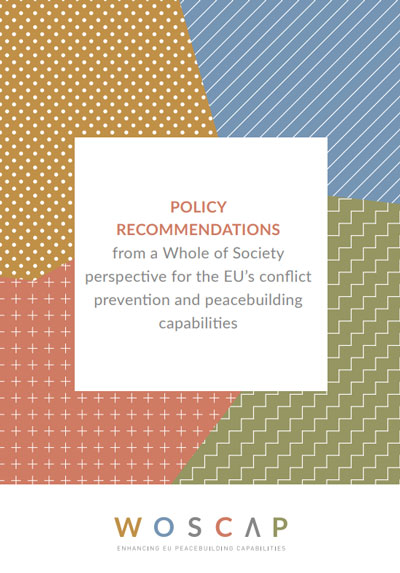WELCOME TO WOSCAP
Welcome to the project "Whole of Society Conflict Prevention and Peacebuilding", or WOSCAP. Its objective is to enhance the capabilities of the EU for implementing conflict prevention and peacebuilding interventions through sustainable, comprehensive and innovative civilian means.
The WOSCAP project has focused on conducting evidence‐based research on EU conflict prevention and peacebuilding, producing a number of research reports on specific countries and key thematic areas. To assess the EU's efforts the project looks at three types of existing EU interventions, namely Multi‐Track Diplomacy, Security Sector Reform, and Governance Reform. Over the course of 2016, this was done through a combination of desk and field research in Mali, Yemen, Georgia, Ukraine, Kosovo, Afghanistan, Sri Lanka, Guatemala and Honduras. Various ‘community of practice' events and forums for dialogue on thematic areas have brought together policymakers, civilian and military practitioners, academic experts and the beneficiaries of EU interventions. In 2017 the project has been focussing on producing a tailored set of recommendations to improve the EU's civilian means for conflict prevention and peacebuilding.
This space contains updates on progress, latest publications, upcoming events, and more. Find what you are looking for in one the following sections, which respond to the project's 4 sub-objectives:

To assess past and ongoing conflict prevention and peacebuilding initiatives of the EU and its partners.

To create an evidence base of best practices and lessons learned, in order to identify capability gaps in current EU and partner engagements, and elaborate options for change and potential improvements in long-term peacebuilding efforts by civilian means.

To complement and adjust existing capacities, policies, and initiatives for conflict prevention and peacebuilding, through an inclusive policy-practice dialogue and the development of policy recommendations.

To make a significant contribution to civilian conflict prevention and peacebuilding, by identifying future research priorities, and enhancing the potential of information and communication technologies.
NEWS
WOSCAP Methodology Workshop in Barcelona, 8-10 February 2016
Researchers from l'Université des Sciences Juridiques et Politiques de Bamako and the Political Development Forum are meeting in Barcelona to present the research topics focused on the nature of...Upcoming WOSCAP Methodology Workshop in Ukraine
On January 25th and 26th, the WOSCAP partner in Ukraine, the Institute of World Policy, is hosting a Methodology Workshop.WOSCAP Partners meeting in London, 2-3 December 2015
On December 2nd and 3rd, partners of the WOSCAP project are meeting in LondonInception Workshop in The Hague, June 2015
The WOSCAP consortium partners met in The Hague on June 22nd for the kick off meeting of the projectUpdate on deliverables
In the inception phase of the WOSCAP project, “Phase 1 – Project inception and theoretical grounding”, the Project Coordinator, GPPAC, and the Scientific Lead, University of Utrecht, produced the...PROJECT SUMMARY
You can download the project summary here.
woscap brochure
You can download the new WOSCAP brochure and leaflets from this page.
Policy Recommendations
Access the
Policy Recommendations booklet here.
VIDEOS
Conference on Effectiveness & Inclusivity of EU Peacebuilding & Conflict Prevention - WOSCAP & IECEU
Why is Local Ownership to Peacebuilding Important?
Mary Martin on the Whole-of-Society Approach
Véronique Dudouet on the Research of the WOSCAP Project
Mary Martin on the Importance of the Whole-of-Society Approach
Georg Frerks on peacebuilding of the EU in the case of Sri Lanka.
Gert Kampman on the on-the-ground cooperation between the EU partners in the Occupied Palestinian Territory
Ben Moore on the contribution of civil society for EU peacebuilding & conflict prevention
Reflections on the project "Whole of Society Conflict Prevention and Peacebuilding"





